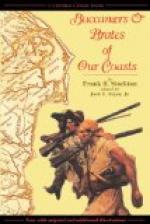From this title it is probable that our literary pirate accompanied his comrades on their various voyages and assaults, in the capacity of reporter, and although he states he was present at many of “those tragedies,” he makes no reference to any deeds of valor or cruelty performed by himself, which shows him to have been a wonderfully conscientious historian. There are persons, however, who doubt his impartiality, because, as he liked the French, he always gave the pirates of that nationality the credit for most of the bravery displayed on their expeditions, and all of the magnanimity and courtesy, if there happened to be any, while the surliness, brutality, and extraordinary wickednesses were all ascribed to the English. But be this as it may, Esquemeling’s history was a great success. It was written in Dutch and was afterwards translated into English, French, and Spanish. It contained a great deal of information regarding buccaneering in general, and most of the stories of pirates which we have already told, and many of the surprising narrations which are to come, have been taken from the book of this buccaneer historian.
Chapter X
The Story of Roc, the Brazilian
Having given the history of a very plain and quiet buccaneer, who was a reporter and writer, and who, if he were now living, would be eligible as a member of an Authors’ Club, we will pass to the consideration of a regular out-and-out pirate, one from whose mast-head would have floated the black flag with its skull and cross-bones if that emblematic piece of bunting had been in use by the pirates of the period.
This famous buccaneer was called Roc, because he had to have a name, and his own was unknown, and “the Brazilian,” because he was born in Brazil, though of Dutch parents. Unlike most of his fellow-practitioners he did not gradually become a pirate. From his early youth he never had an intention of being anything else. As soon as he grew to be a man he became a bloody buccaneer, and at the first opportunity he joined a pirate crew, and had made but a few voyages when it was perceived by his companions that he was destined to become a most remarkable sea-robber. He was offered the command of a ship with a well-armed crew of marine savages, and in a very short time after he had set out on his first independent cruise he fell in with a Spanish ship loaded with silver bullion; having captured this, he sailed with his prize to Jamaica, which was one of the great resorts of the English buccaneers. There his success delighted the community, his talents for the conduct of great piratical operations soon became apparent, and he was generally acknowledged as the Head Pirate of the West Indies.




